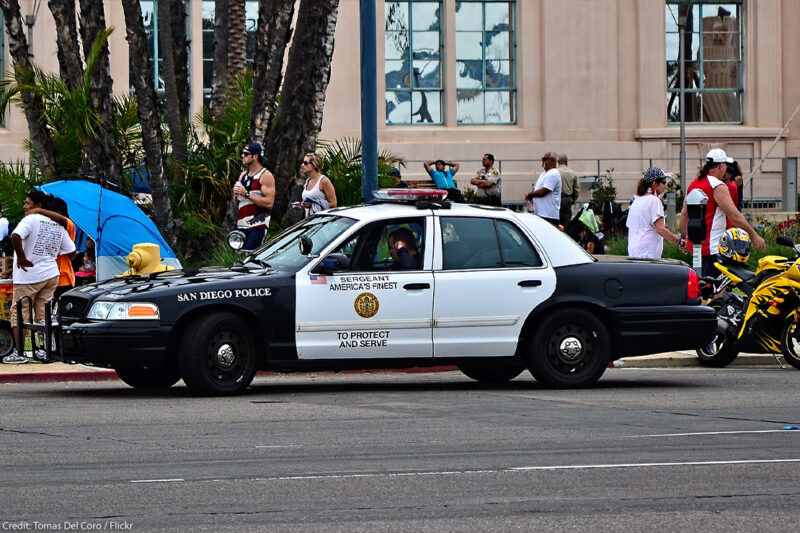San Diego Police Stop Black People at a Rate 219 Percent Higher Than White People.


ŌĆ£They did what human beings looking for freedom, throughout history, have often done. They left.ŌĆØ
These are the words of Pulitzer Prize-winning author Isabel Wilkerson in her book, ŌĆ£The Warmth of Other Suns.ŌĆØ The book follows the story of three Black Southerners and their journey escaping racial violence ŌĆö a sharecropper's wife who left Mississippi in the 1930s for Chicago, an agricultural worker who left Florida for New York City in the 1940s, and a doctor who left Louisiana in the early 1950s.
Their journey was part of the Great Migration that occurred between 1916 and 1970, where 6 million Black people moved out of the rural South to the urban Northeast, Midwest, and West. As a native Texan moving to Southern California, I was curious to learn more about the experience of Black Southerners who moved here before me. I learned that this region held promise of safety and security for Black people escaping the ever-present threat of violence and death in the South. But as Black families found out then and Black communities today know all too well, while the warmth of San DiegoŌĆÖs sun might be gentler than the heat of the South, they both cast the familiar shadow of racial violence that Black people across the country canŌĆÖt escape.
As a policy associate for the └Ž░─├┼┐¬Į▒Įß╣¹ of San Diego & Imperial Counties, I advocate for policies that advance police accountability. Recently, our office commissioned a that looked at data from the San Diego Police Department and the San Diego County SheriffŌĆÖs Department and analyzed it for racial and identity disparities.
Here is what the report found:
The San Diego Police Department (SDPD):
- Stopped Black people at a 219 percent higher rate than white people. In 85 percent of SDPD beats, Black people were stopped at higher rates than white people.
- Was 23 percent more likely to conduct consent searches on Black people than white people, despite being less likely to be found with contraband than white people.
- Was more likely to use force and even more severe forms of force against Black people than white people.
The story was not any better at the county level. The San Diego County SheriffŌĆÖs Department:
- Stopped Black people at a 130 percent higher rate than white people. In every area of jurisdiction, Black people were stopped at higher rates than white people.
- Was 19 percent more likely to search people they perceived to be LGBTQ or gender non-conforming and 38 percent more likely to arrest them without a warrant compared to people who were not perceived to be LGBTQ or gender non-conforming. This disparity was particularly worse for the Black people in this demographic.
- Used more severe levels of force against Black people and Asian/Pacific Islanders.
This is the reality that Black San Diegans, Black Californians, and Black Americans face on a daily basis. Our movement and freedom is policed more often and more severely than our white neighbors. The sad irony about Black people and families that moved to California to escape violence during the Great Migration is that they and their descendants now live in . Of those killings, Black people are disproportionately represented.
A that nationwide, 1 in every 1,000 Black men can expect to be killed by police. In fact, 13 of the 100 largest U.S. city police departments kill Black men at higher rates than the U.S. murder rate.
Although police brutality and killings of civilians have incredible human costs, there is tremendous harm, both physical and psychological, inflicted by even the most routine police activity. Across the country, law enforcement agencies regularly monitor, harass, profile, stop, search, question, detain, and arrest Black people at to their population.
Just as laws were used to respond to the violence of Jim Crow, we also need laws that protect Black communities from racially disparate policing. California has begun to make headway in this regard by: The California Act to Save Lives, which created a higher, ŌĆ£necessaryŌĆØ standard for when police can use force. Now, we need to raise the standard for when police can stop and search people ŌĆö in California and across the country.
America has begun to begrudgingly recognize Black peopleŌĆÖs humanity, freedom, and civil rights. And yet, there is still so much work to do. When I feel discouraged by the slow progress of racial justice, I find comfort in the words of the Black National Anthem, written just before the start of the Great Migration.
It goes:
Sing a song full of faith that the dark past has taught us,
Sing a song full of hope that the present has brought us,
Facing the rising sun of our new day begun,
Let us march on till victory is won.
From to fighting law enforcementŌĆÖs use of intrusive surveillance technology (i.e.,), San Diegans ŌĆö in solidarity with communities across the country ŌĆö are marching boldly, loudly, and unapologetically toward that day where freedom also includes freedom of Black movement.


